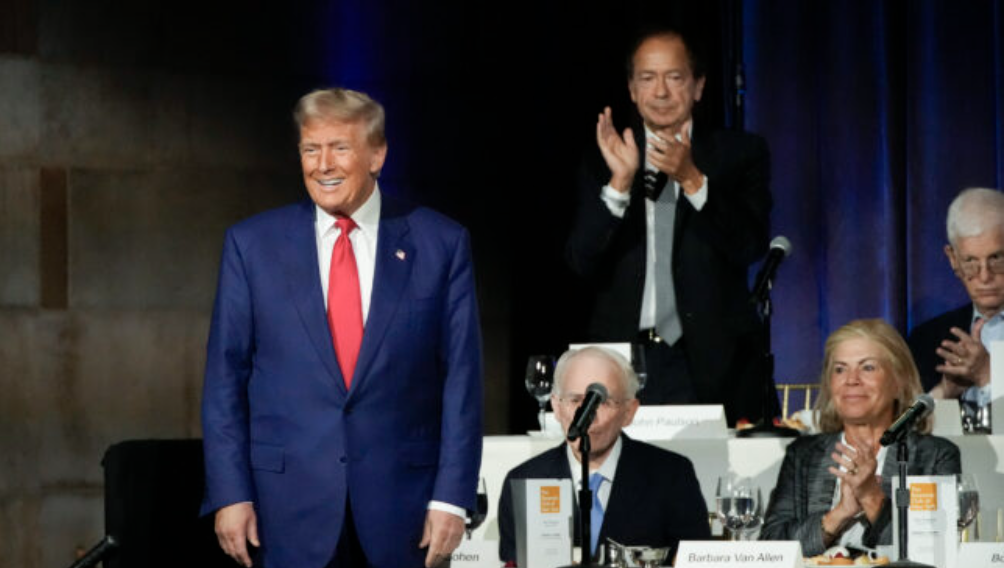In a speech to the Economic Club of New York on Thursday, Donald Trump laid out a comprehensive economic vision under the banner “Make America Affordable Again”.
Trump’s plan focuses on reducing wasteful government spending, reducing the scope of regulations and freeing up domestic energy production – all of which he sees as crucial to revitalising the economy.
“My plan will quickly combat inflation, bring prices down fast and reignite explosive economic growth,” says the Republican presidential candidate.
Trump also wants to create a sovereign wealth fund – not unlike the Norwegian oil fund – which will be used in part to finance major infrastructure projects such as motorways, airports and industrial centres.
In addition, he promises to set up a special commission to reform the state apparatus and cut costs. He envisions X owner and Tesla CEO Elon Musk leading the new agency. The latter says the two have spoken and that he is interested, NTB wrote yesterday.
“I look forward to serving the United States if the opportunity arises. I don’t need a salary or title or recognition,” Musk wrote on X.
I look forward to serving America if the opportunity arises.
No pay, no title, no recognition is needed. https://t.co/5PSNtjBQn7
– Elon Musk (@elonmusk) September 5, 2024
The alliance shows that Musk, one of the world’s richest people and head of several businesses, is not only interested in getting Trump elected, but also wants to actively participate in influencing federal policy, writes the Wall Street Journal.
Trump promises to cut regulations by ten for every new regulation he introduces. The US is riddled with an enormous amount of regulations that make manufacturing more expensive and complicated and push up house prices, which are also under pressure from massive illegal migration.
By cutting back on regulations and opening up federal lands for large-scale housing construction, Trump hopes to lower the cost of housing, which is a pressing issue for many Americans. By closing the borders and deporting millions of illegal migrants, Trump will be able to make a significant effort to loosen up the housing market.
There could be problems, however. Musk’s businesses, including Tesla and SpaceX, are regulated by multiple federal agencies, potentially leading to conflicts of interest should he become actively involved in a commission on government spending.
Trump’s speech stands in clear contrast to Biden-Harris’s economic policies, which he believes have only made life more expensive for American families. This is especially true when it comes to fossil fuels. The US has enormous sources of oil and gas deposits, and Trump wants to maximise these, unlike the incumbent regime.
The US was self-sufficient in oil and gas during Trump’s previous presidency, and this is an obvious goal for Trump in a new term. Nor is it impossible that there will be an increase in production in profitable coal mines.
The green shift is likely to hit a wall. Trump is unlikely to be willing to pour huge subsidies into so-called renewable industries that are neither renewable nor effective.
In terms of taxes, there are also obvious differences. Kamala Harris wants to increase corporate tax from 21 to 28 per cent. She wants the government to control as much of the money supply as possible.
Trump, on the other hand, wants to reduce the tax level for all production on American soil to 15 per cent.
The latter proposal has received a mixed reception. While many business leaders and economists believe this will lead to a growth in US-produced goods, there are also concerns that this could cause bureaucratic problems, particularly for the production of complex goods that rely on a certain amount of imported raw materials.
It might have been possible for Trump to achieve his goals in a simpler way, such as imposing tariffs on selected product groups. But the plan is not yet finalised, so we’ll have to wait and see.
Trump made a number of bold promises, which the WSJ believes are easier said than done. He promised, among other things, to eliminate the budget deficit and halve energy prices in one year.
Trumps also claimed that 100 per cent of net job creation over the past year has gone to illegal migrants. The claim is based on a census survey that, according to some economists, underreports population and employment.
If Trump succeeds in streamlining government agencies, reducing energy prices, bringing down house prices and at the same time reducing the number of regulations, he will stop the inflation that has characterised much of Biden’s term.
Inflation is the issue that matters most to Americans when deciding who to vote for, and migration is another important issue, the second most important issue to voters. On both of these issues, Trump clearly has the highest level of trust with voters compared to Harris.
Trump’s economic plan is bold and daring. It will of course create some challenges, so it remains to be seen whether he succeeds with his most ambitious goals.
Either way, the plan points in a direction that benefits private businesses and households. Harris’s plan points in the opposite direction, and the goal is an ever-larger government agency.
The election will be held on 5 November.

